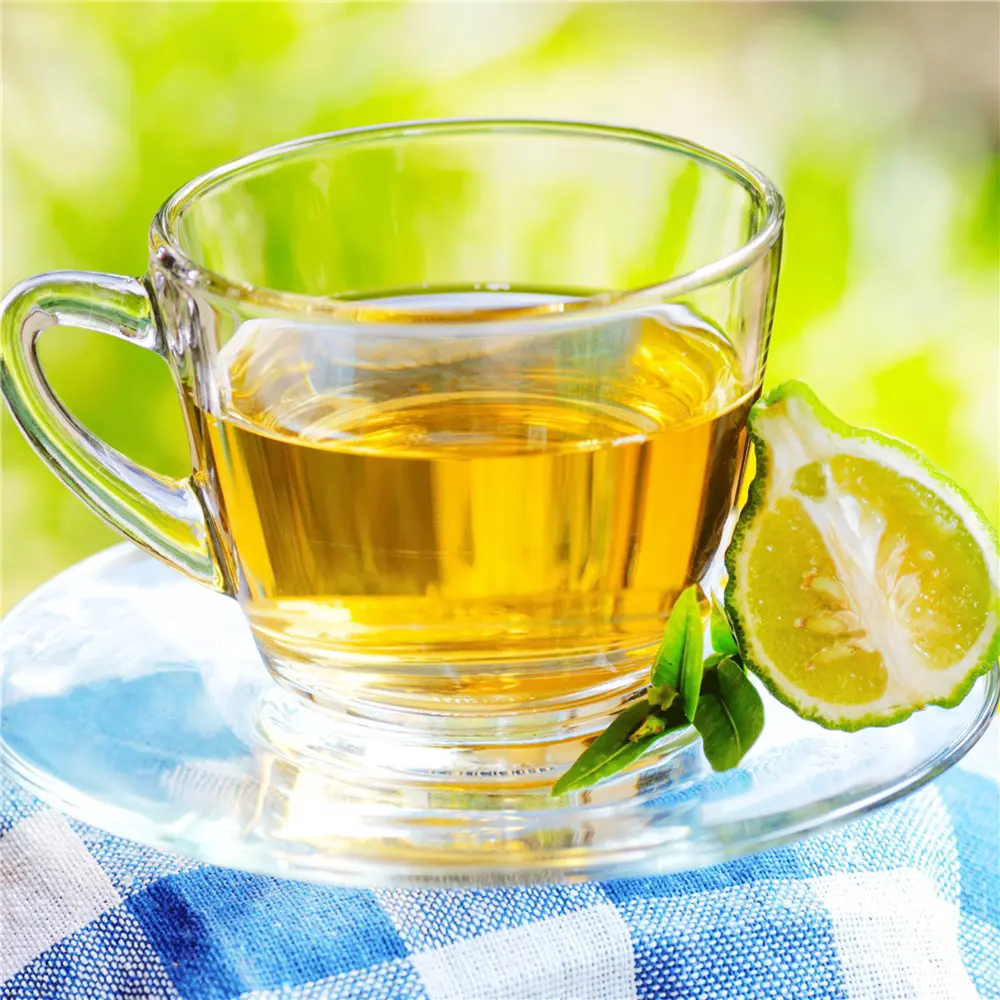14 Bergamot Benefits and Nutrition

Bergamot, a fragrant citrus fruit known for its distinctive aroma, is more than just a key ingredient in Earl Grey tea. Revered for its numerous health benefits and versatile applications, bergamot has a rich history and a promising future in both culinary and medicinal fields.
This comprehensive guide will delve into the history of bergamot, its nutritional profile, fourteen health benefits, potential health risks, and various forms and uses.
Health Benefits of Bergamot
1. Cardiovascular Health
Bergamot contains unique polyphenols such as brutieridin and melitidin, which have been shown to lower LDL (bad) cholesterol and triglycerides while increasing HDL (good) cholesterol. This helps prevent plaque buildup in arteries, reducing the risk of atherosclerosis, heart attacks, and strokes.
Additionally, bergamot's anti-inflammatory properties help protect the cardiovascular system by reducing chronic inflammation, which is a contributing factor to heart disease.
2. Antioxidant Properties
Bergamot is rich in antioxidants, including vitamin C and flavonoids, which combat oxidative stress by neutralizing free radicals. This reduces cellular damage, lowers the risk of chronic diseases like cancer and heart disease, and slows the aging process.
The antioxidants in bergamot also enhance overall health by supporting the body's natural defense mechanisms against environmental and internal stressors.
3. Anti-Inflammatory Effects
The flavonoids and essential oils in bergamot, such as limonene and linalool, exhibit potent anti-inflammatory effects. These compounds help reduce inflammation throughout the body, alleviating symptoms of chronic inflammatory conditions like arthritis, inflammatory bowel disease, and certain skin conditions.
Regular consumption or use of bergamot can contribute to a decrease in inflammation markers and improved health outcomes.
4. Antimicrobial Activity
Bergamot oil has strong antimicrobial properties, effective against a variety of pathogens, including bacteria (e.g., Staphylococcus aureus), fungi (e.g., Candida species), and viruses (e.g., herpes simplex virus).
This makes it useful for treating infections, preventing the spread of germs, and promoting wound healing. Bergamot oil can be used topically or in diffusers to cleanse and purify the environment, making it a valuable tool for maintaining hygiene.
5. Digestive Health

Bergamot's fiber content aids in digestion by promoting regular bowel movements and preventing constipation. Its essential oils have carminative properties that relieve bloating, gas, and indigestion.
Additionally, bergamot can stimulate the production of digestive enzymes, enhancing overall digestive efficiency. Incorporating bergamot into your diet can improve gut health and alleviate common digestive issues, promoting a balanced and healthy digestive system.
6. Stress and Anxiety Relief
Aromatherapy with bergamot essential oil is known to alleviate stress and anxiety. Inhaling bergamot oil can reduce cortisol levels, promoting a sense of calm and relaxation. It also influences neurotransmitter activity, boosting mood and reducing symptoms of depression and anxiety disorders.
Using bergamot oil in diffusers, baths, or massages can create a soothing atmosphere that helps manage stress and enhances mental well-being.
7. Skin Health
Bergamot oil is widely used in skincare for its antiseptic, antibacterial, and anti-inflammatory properties. It helps treat acne by reducing sebum production and killing acne-causing bacteria.
Additionally, bergamot oil can soothe irritated skin, speed up the healing of minor wounds, and improve conditions like eczema and psoriasis. Adding bergamot oil to skincare routines can enhance skin clarity and health, promoting a glowing complexion.
8. Weight Management
Bergamot polyphenols, particularly brutieridin and melitidin, inhibit enzymes that contribute to fat accumulation. This helps regulate body weight and may assist in preventing obesity. Furthermore, bergamot can improve metabolic function, aiding in more efficient fat and carbohydrate metabolism.
Including bergamot in your diet can support weight management goals by promoting fat loss and preventing excess weight gain.
9. Blood Sugar Control
Studies suggest that bergamot extract can improve insulin sensitivity and regulate blood sugar levels, making it beneficial for individuals with diabetes or those at risk of developing the condition.
By influencing glucose metabolism, bergamot helps maintain stable blood sugar levels and prevents spikes and crashes. Consuming bergamot regularly can contribute to better blood sugar management and overall metabolic health.
10. Oral Health
Bergamot’s antimicrobial properties make it beneficial for oral health. It can help reduce the growth of harmful bacteria in the mouth, preventing cavities, gum disease, and bad breath. Using bergamot oil in oral care products can enhance overall oral hygiene.
Incorporating bergamot into your dental routine can help maintain a clean and healthy mouth, reducing the risk of oral infections and promoting fresh breath.
11. Immune Support
The high vitamin C content in bergamot boosts the immune system by stimulating the production of white blood cells, enhancing the body’s ability to fight off infections. Bergamot’s antioxidants further support immune function by reducing oxidative stress and inflammation.
Regular consumption of bergamot can strengthen the immune system, helping the body resist infections and recover more quickly from illnesses.
12. Liver Health
Bergamot polyphenols have hepatoprotective properties, protecting the liver from damage caused by toxins, alcohol, and metabolic stress. These compounds can improve liver function, enhance detoxification processes, and reduce the risk of liver diseases such as fatty liver disease and hepatitis.
Including bergamot in your diet can support liver health, promoting efficient detoxification and reducing the risk of liver-related conditions.
13. Mood Enhancement

The uplifting scent of bergamot oil has a positive effect on mood and cognitive function. It can help reduce feelings of anxiety, depression, and mental fatigue. Inhaling bergamot oil stimulates the release of serotonin and dopamine, neurotransmitters associated with happiness and relaxation.
Using bergamot in aromatherapy can create a positive and invigorating environment, enhancing mood and mental clarity.
14. Hair Health
Bergamot oil promotes healthy hair by reducing scalp inflammation, balancing oil production, and combating dandruff. It can also strengthen hair follicles, enhance hair shine, and prevent hair loss.
Using bergamot oil in hair care routines can improve overall scalp and hair health. Adding a few drops of bergamot oil to shampoos or conditioners can result in stronger, shinier, and healthier hair.
Nutritional Profile of Bergamot
Bergamot is a nutrient-rich citrus fruit, that offers a variety of essential vitamins and minerals. Here is a look at its nutritional composition per 100 grams:
- Calories: 47 grams
- Carbs: 12 grams
- Protein: 1 gram
- Fat: 0 grams
- Saturated fat: 0 grams
- Net carbs: 9 grams
- Dietary fiber: 2 grams
- Total sugars: 9 grams
- Cholesterol: 0 milligrams
- Sodium: 0 milligrams per
- Vitamin A: 67 micrograms
- Vitamin C: 53 milligrams
Vitamin C
Bergamot is exceptionally high in vitamin C, a potent antioxidant crucial for protecting the body against oxidative stress and free radical damage. Vitamin C also plays a vital role in boosting the immune system, enhancing the body’s ability to fight infections and illnesses.
Furthermore, it is essential for collagen synthesis, promoting healthy skin, and aiding in wound healing.
Flavonoids
This fruit contains significant amounts of flavonoids, particularly naringin and neohesperidin. These compounds exhibit strong anti-inflammatory and antioxidant properties, helping to reduce inflammation throughout the body and protect cells from oxidative damage.
Flavonoids are also beneficial for cardiovascular health, as they can help improve blood vessel function and reduce the risk of heart disease.
Polyphenols
Bergamot is rich in unique polyphenols, such as brutieridin and melitidin, which have been shown to lower cholesterol levels and improve overall cardiovascular health.
These polyphenols inhibit enzymes involved in cholesterol production, thereby helping to reduce LDL (bad) cholesterol and triglycerides while increasing HDL (good) cholesterol. This action helps prevent plaque buildup in arteries, reducing the risk of atherosclerosis, heart attacks, and strokes.
Dietary Fiber
Bergamot is a good source of dietary fiber, which is essential for maintaining healthy digestion. Fiber aids in promoting regular bowel movements, preventing constipation, and supporting overall gut health.
Adequate fiber intake is also associated with a reduced risk of developing digestive disorders and can help regulate blood sugar levels, making it beneficial for individuals with diabetes.
Essential Oils
The peel of bergamot is rich in essential oils, particularly limonene, linalyl acetate, and linalool. These oils have therapeutic properties, offering a range of benefits from stress and anxiety relief to antimicrobial activity.
Limonene, for instance, has been shown to have mood-enhancing effects and can help reduce symptoms of anxiety and depression. Linalool and linalyl acetate possess anti-inflammatory and analgesic properties, making them useful in reducing pain and inflammation.
Health Risks of Bergamot
While bergamot offers numerous health benefits, it is important to be aware of potential risks and side effects:
- Photosensitivity: Bergamot oil contains bergapten, which can cause photosensitivity, leading to skin irritation and burns when exposed to sunlight. It is advisable to avoid direct sunlight after applying bergamot oil to the skin.
- Allergic Reactions: Some individuals may experience allergic reactions to bergamot oil, including skin rashes and respiratory issues. Conducting a patch test before use is recommended.
- Drug Interactions: Bergamot may interact with certain medications, including those for blood pressure and cholesterol. Consulting a healthcare provider before using bergamot supplements is essential.
- Pregnancy and Breastfeeding: The safety of bergamot during pregnancy and breastfeeding has not been well-established. Pregnant and breastfeeding women should consult their healthcare provider before using bergamot products.
How to Use Bergamot: Forms and Applications

Bergamot can be used in various forms, each offering unique benefits and applications:
1. Essential Oil
Bergamot essential oil is extracted from the peel of the fruit and is widely used in aromatherapy, skincare, and as a flavoring agent. It can be diffused, applied topically (diluted with a carrier oil), or added to personal care products.
2. Tea
Bergamot is famously used to flavor Earl Grey tea. Drinking this tea provides the combined benefits of black tea and bergamot oil, offering a soothing and aromatic experience.
3. Supplements
Bergamot extract is available in supplement form, often used for its cholesterol-lowering and blood sugar-regulating properties. It is essential to follow the recommended dosage and consult a healthcare provider before use.
4. Culinary Uses
Bergamot can be used in cooking and baking, adding a unique citrus flavor to dishes. The zest and juice can be used in marmalades, desserts, and savory recipes.
5. Cosmetic Products
Bergamot oil is a popular ingredient in perfumes, lotions, and soaps, valued for its refreshing scent and skin-benefiting properties.
6. Massage Oils
When diluted with a carrier oil, bergamot essential oil can be used in massage therapy to relax muscles, improve circulation, and enhance overall well-being.
7. Inhalation
Adding a few drops of bergamot oil to a bowl of hot water and inhaling the steam can help alleviate respiratory issues and provide a calming effect.
Recent posts
Nutrition
Nutrition
Licorice Root: Benefits And Uses
You can spell it liquorice or licorice; this herb or root has been in use for centuries in most medicinal applications, as a natural sweetener and to enhance flavors. Regarding its origins, it comes from the root of the "Glycyrrhiza galbre" plant and...
Nutrition
Is Salmon Good For You? Nutritional Facts and Benefits
Salmon fish is a staple diet throughout the world, popular as a super food for its nutrients. Whether savored in sushi, poached, grilled, roasted, or pan-fried, salmon offers minerals and vitamins that contribute to healthy bodily functions. In addit...
Nutrition
25 Smoked Salmon Recipes That You Will Enjoy
Salmon is a silver-colored fish that is loaded with many nutrients, vitamins, and omega-3 fatty acids. Smoked Salmon is better for improving your health and reducing the risk of cancer, heart-related diseases, fights inflammation, reduces anxiety and...
Nutrition
Are Sausages Healthy? Nutrition And Health Benefits
Sausages are tasty in an addictive way, making them one of the most popular foods worldwide. You may have enjoyed this convenient food often, whether on a bun with mustard or grilled on a barbecue, the simple preparation methods are what makes its co...
Nutrition
20 Vegetables That Are Rich In Iron
Iron is essential for our bodies to function well. When we don't get enough iron, we often feel weak and tired. It's important to address iron deficiency early by eating the right foods. Fortunately, many vegetables are rich in iron and can help prev...
Nutrition
15 Cauliflower Nutrition Facts And Health Benefits
Cauliflower, a cruciferous vegetable, resembles a white variation of its relative, broccoli. Like broccoli, it has closely bunched florets attached to a thick core, often surrounded by a few leaves. While white is the most common color, cauliflower i...







